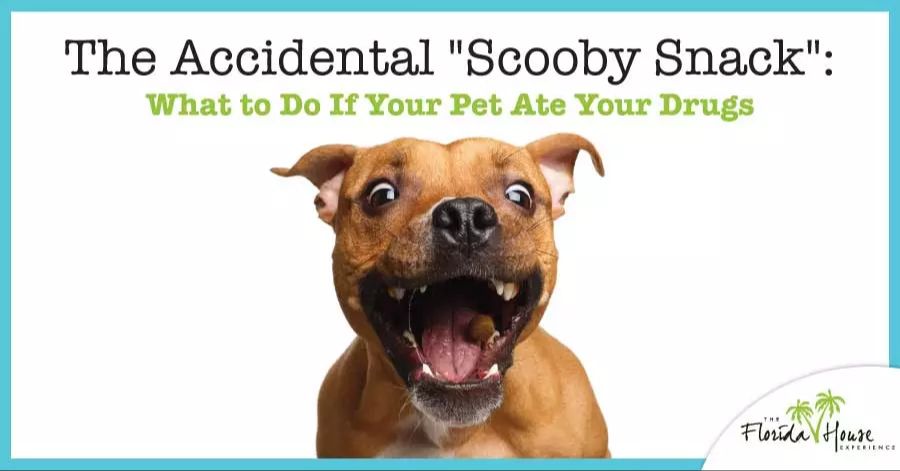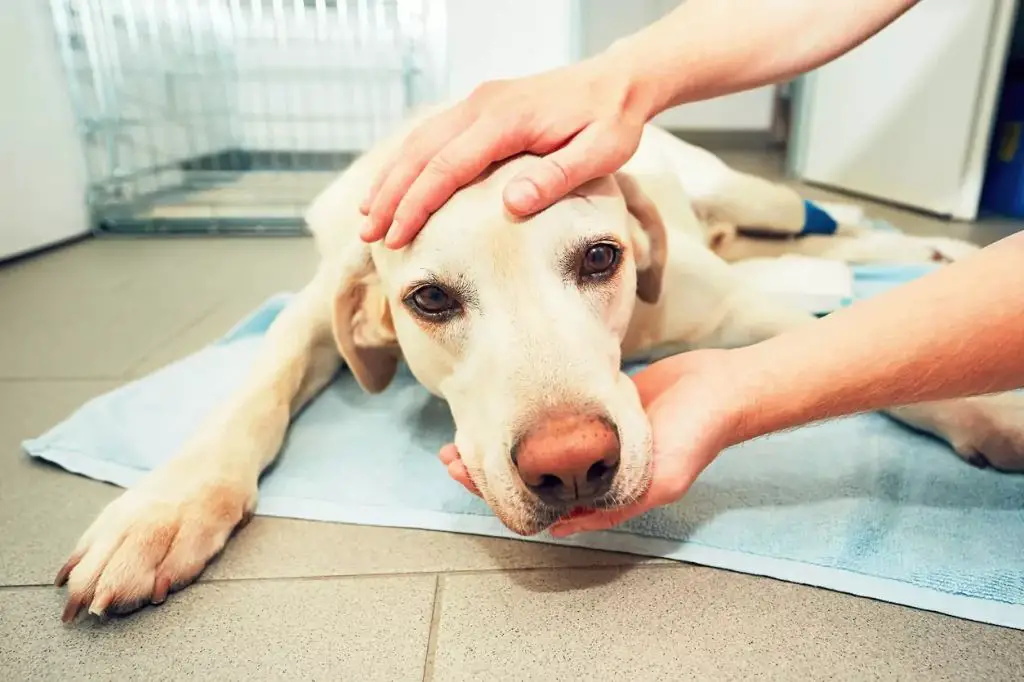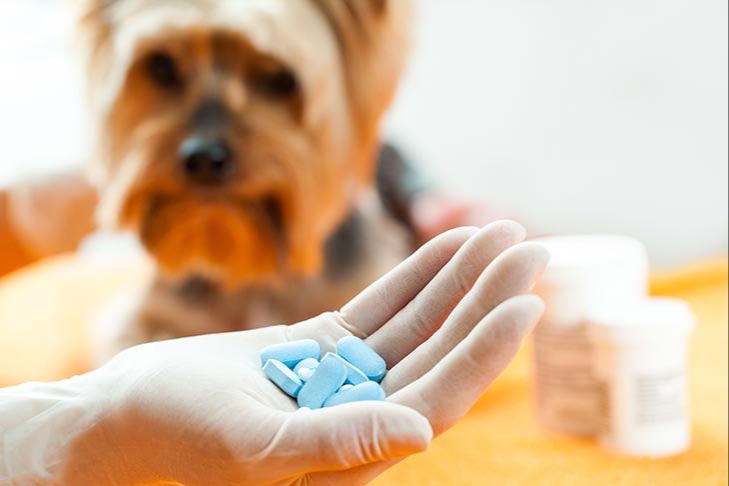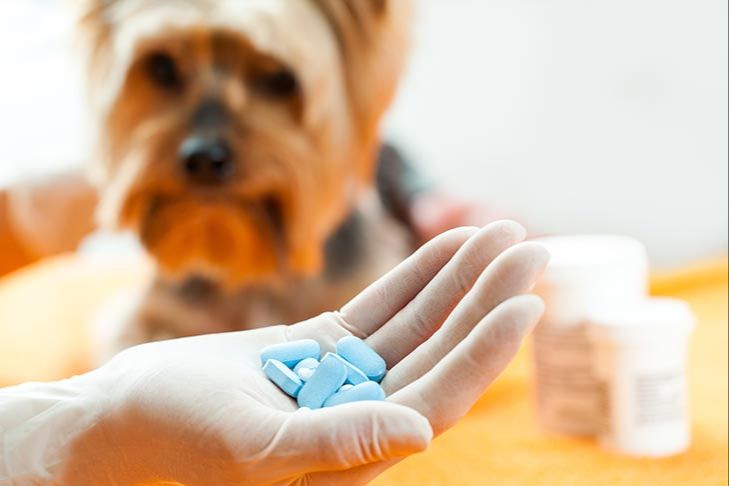Introduction
At some point, most dog owners have accidentally taken their dog’s medication instead of their own. While ingesting dog medication is generally not cause for alarm, it’s important to understand the potential risks and how to respond if it happens.
This article will cover the key differences between human and dog medications, common dog medications dog owners should be aware of, potential health risks from ingesting dog medications, what to do if you accidentally take dog medication, tips for preventing accidental ingestion, special considerations for children, concerns with certain human medications, when you should be worried, and provide some concluding thoughts.
Key Differences Between Human and Dog Medications
There are several important differences between human and dog medications that are crucial to understand. Most notably, dosing is very different. Dog medications are formulated specifically for canine physiology and metabolism. The doses and concentrations in dog medications can be toxic to humans if ingested, especially in the larger quantities that dogs take.
For example, a medication dosage for a large dog may be formulated for an animal weighing 50-100 lbs. If a human child or adult accidentally ingests this dose, it could be an overdose. The effects and drug interactions can be dramatically different in people compared to dogs. Many dog medications, such as flea and tick treatments, can cause neurological toxicity in humans.
Additionally, inactive ingredients in dog medications may not be safe for human consumption. Flavorings and compounds meant to appeal to dogs can sometimes be problematic if ingested by people. Overall, dog medications are created for canine physiology, and their effects can be unpredictable and unsafe in human bodies. Dosing and toxicity risks are a key concern.
Common Dog Medications
Some of the most common medications prescribed to dogs include:
- Heartworm Prevention Medication – Prevents heartworm disease which is spread by mosquitos. Examples include ivermectin, milbemycin oxime, and selamectin.
- Flea and Tick Prevention Medication – Kills fleas and ticks on dogs to prevent infestations and diseases. Common medications include fipronil, imidacloprid, and selamectin.
- Antibiotics – Used to treat bacterial infections. Common antibiotics for dogs include amoxicillin, doxycycline, and cephalexin.
- Anti-Inflammatory Medication – Reduces pain, swelling, and inflammation. Commonly prescribed NSAIDs for dogs include carprofen, meloxicam, and deracoxib.
- Steroids – Used to reduce inflammation and suppress the immune system. Prednisone and dexamethasone are commonly prescribed steroids.
- Antihistamines – Used to treat allergies and itchiness. Diphenhydramine and hydroxyzine are first-generation antihistamines for dogs.
- Antiemetics – Prevents vomiting and nausea. Ondansetron and maropitant are common antiemetics for dogs.
- Behavior Medications – Treats anxiety, aggression, and other behavioral issues. Prozac, amitriptyline, and clomipramine are prescribed for dogs.
- Pain Medication – Provides pain relief after surgery or injury. Tramadol, fentanyl, and buprenorphine are commonly used.
This covers some of the most common medications prescribed for dogs, but there are many more that may be used depending on the health condition. It’s important to keep all medications, even pet medications, stored safely and out of reach.
Risks of Ingesting Dog Medications
While pet medications are formulated for animal use, ingesting dog medications can still produce side effects in humans. The most common risks of accidentally ingesting dog medication include:

- Gastrointestinal upset – Vomiting, diarrhea, and abdominal pain are common side effects, as pet medications may contain ingredients that irritate the digestive tract.
- Neurological effects – Some pet medications act on the nervous system and can cause drowsiness, disorientation, tremors or seizures in humans if too much is ingested.
- Organ damage – Certain pet meds like NSAIDs and dewormers can potentially cause liver or kidney problems at high doses.
- Hormonal problems – Steroid medications may disrupt normal hormone levels.
- Heart issues – Some dog meds can affect heart rate and blood pressure.
- Allergic reaction – People may be allergic to components in animal medications.
The severity of symptoms depends on the amount ingested and the individual medication. Very high doses could potentially be toxic. Certain medications like antidepressants, pain meds, and ADD/ADHD drugs for dogs pose higher risks and require immediate medical attention after accidental ingestion.
What to Do If You Ingest Dog Medication

If you or someone you know accidentally ingests dog medication, remain calm but act quickly. The first thing you should do is check the label and identify the medication if possible. Call poison control or your doctor immediately for medical advice – have the medication name, ingredients, and dosage ready to provide details. Poison control may recommend you induce vomiting, drink water, or just observe symptoms depending on the type of medication ingested.
Seeking prompt medical attention is crucial, even if you feel fine after ingesting dog medication. Many dog medications like NSAIDs, heartworm prevention, and antidepressants can cause serious harm if too much is ingested by a human. Side effects like vomiting, diarrhea, ulcers, kidney damage, seizures, and even coma are possible depending on the medication and dosage.
An examination by a medical professional is important to check for any potential adverse effects. Tests like blood work, urinalysis, and ECG may be conducted to check for organ damage and other problems. Treatment may include pumping the stomach, administering activated charcoal, intravenous fluids, antidotes, or medications to control symptoms.
The sooner you seek help after accidental ingestion, the better the outcome typically is. Do not wait for symptoms to appear before getting medical assistance. With rapid appropriate treatment guided by poison control or your doctor, you can usually avoid any lasting effects.
Preventing Accidental Ingestion
Accidents can happen, so it’s important to take steps to prevent accidentally ingesting your pet’s medication. Here are some tips to reduce the chances of confusion or ingestion:
- Store all medications in their original containers with clear labels. Never transfer pet medications to containers meant for human meds.
- Keep pet medications completely separate from human ones. Store them in a different area altogether, like a high cabinet or different room.
- Set cell phone alerts to remind you when to take your own medications.
- Double check labels carefully before taking anything.
- Supervise children around all medications.
- Dispose of unneeded pet medications properly by returning them to your vet or a medication disposal program. Don’t simply throw them in the trash.
Staying organized, vigilant about proper storage, and taking preventative measures can go a long way in avoiding mix-ups between human and animal drugs.
Special Considerations for Children
Children are at higher risk for accidental ingestion of medications, including pet medications. Child-resistant packaging has helped reduce risk, but children’s natural curiosity and developing coordination can still lead to accidents.

The consequences of a child ingesting dog medication can be more severe than for adults. Children have smaller bodies, so a dose meant for a pet can have an amplified effect. Immature livers and kidneys may have more difficulty processing medications as well.
Signs of pet medication poisoning in kids include vomiting, diarrhea, excessive sleepiness, agitation, seizures, and loss of coordination. Effects like low blood sugar and electrolyte abnormalities can also occur. Some dog medications like NSAIDs can cause stomach ulcers or kidney damage in children.
To help prevent accidental ingestion by kids:
- Keep all medications in childproof containers and stored up and away after each use.
- Never remove pet pills from their original bottles.
- Do not take medicine in front of children as they may try to imitate you.
- Discard empty medication bottles so they are not a temptation for play.
- Teach children to never touch medications unless given by a parent/guardian.
Take steps to pet-proof your home like keeping medications locked away or blocking access to counter tops. Closely supervise young children around pets and their belongings to watch for mouthing behaviors. Promptly store medications after administering to your pet.
Special Considerations for Certain Medications
Some types of dog medications require extra precautions if accidentally ingested by humans. This includes medications like:
- Heartworm prevention medication – These contain insecticides that can be toxic to humans in larger doses. Small ingestions likely won’t cause issues, but larger accidental ingestion warrants immediate medical care. These medications are especially dangerous for young children.
- Flea and tick medication – Like heartworm medication, flea/tick prevention contains insecticides that can be toxic in higher amounts. Medical care is recommended, especially if a child ingests the medication.
- Non-steroidal anti-inflammatory drugs – Drugs like Rimadyl fall into this category. While useful for dogs, they can cause kidney and liver damage in humans if too much is ingested. Seek medical attention.
- Medications containing xylitol – Xylitol is extremely toxic to dogs but generally safe for humans. However, consuming large amounts from canine medications can cause a dangerous blood sugar crash.
Overall, use extra caution if you or a child accidentally ingests these types of veterinary medications, even in small amounts. It’s smart to contact poison control or your doctor right away.
When to Worry
While most cases of accidentally ingesting dog medication do not require emergency care, certain symptoms warrant urgent medical attention. These include:

- Difficulty breathing
- Swelling of the lips, face, throat, or tongue
- Fainting or loss of consciousness
- Seizures
- Chest pain or tightness
- Irregular heartbeats
- Vision changes
- Muscle weakness
- Severe abdominal pain
- Bloody vomit or stools
In addition, if a child accidentally ingests dog medication, emergency care should be sought even if they are not displaying any symptoms yet. The same applies to certain high-risk medications like heart medications, antidepressants, ADHD medications, and opioids.
If you or a child display any of the above symptoms after ingesting dog medication, call emergency services or go to the nearest emergency room right away. Severe allergic reactions and overdoses can be fatal if not treated promptly. Do not try to treat the symptoms yourself or “wait and see” if they get better.
Conclusion
As we’ve seen, accidents happen. However, being informed and prepared can limit the risks when ingesting dog medications. Remember, keep medications safely stored, know the common dog medications, understand the dangers, and act quickly if an accidental ingestion occurs. Your vigilance is key to keeping your family safe. While most incidents will only result in minor symptoms, it’s important to observe for concerning reactions and seek medical care when warranted. By taking proper precautions and familiarizing yourself with dog medications, you can rest assured knowing you’re creating a safe environment for family and pets alike.
At the end of the day, the most important thing is preventing any serious harm from occurring. Though medicine mix-ups occur, through awareness and responsible care we can avoid potentially life-threatening situations. While our furry friends bring us comfort and joy, we must be mindful of safely caring for their health, as well as our own.